新编英语教程第三版第三册·U1
新编英语教程第三第一册unit

on a … basis / on the basis of 以...为根据, 在...基础上 [搭配] daily, monthly, weekly, etc. 按日、按月、每周等 regular 有规律的方式 They charge customers on an hourly basis. 他们按钟点向顾客收费。 Don't evaluate a person on the basis of appearance. 不要以貌取人。
keep them free from harm.
母鸡把小鸡护在翅膀下,保护它们免受伤害.
Our new products are made of materials free from pollution.
我们的新产品是由无污染材料制成的.
第9页/共19页
hustle and bustle busy energetic activity 熙熙攘攘; 忙碌喧闹 I hate the hustle and bustle of holiday shopping. 我讨厌节假日购物挤来挤去的.
第15页/共19页
adjust to 调整, 调节 My eyes haven't adjusted to the dark yet. 我的眼睛还没有适应黑暗。 Animals adjust themselves to their environment. 动物能适应自己生活的环境。 It is difficult to adjust one's habits to someone else. 一个人很难使自己的习惯适于他人。
第17页/共19页
available: a. ③(informal) not currently involved in a sexual or romantic relationship (非正式)独身的,单身的 There's no available women here. 这儿没有单身女人。 [antonym] unavailable avail: v. 利用; 有益于 avail oneself of: 利用… availability: n. 可用性
《新编英语教程》第三册课文及翻译
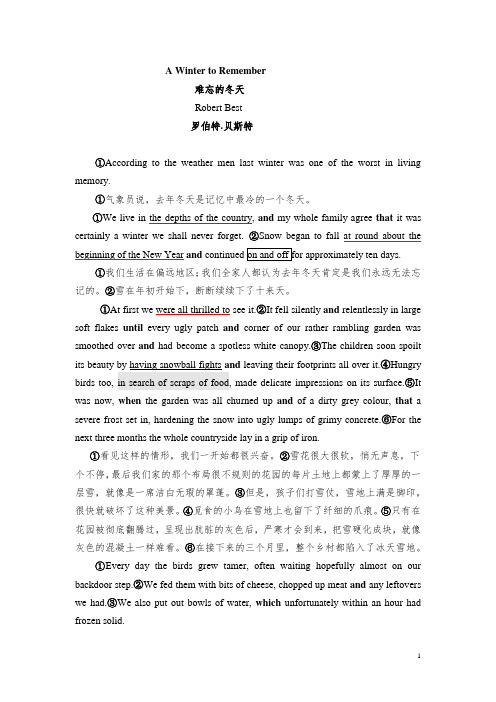
A Winter to Remember难忘的冬天Robert Best罗伯特.贝斯特①According to the weather men last winter was one of the worst in living memory.①气象员说,去年冬天是记忆中最冷的一个冬天。
①We live in the depths of the country, and my whole family agree that it was certainly a winter we shall never forget. ②Snow began to fall at round about thebeginning of the New Year and①我们生活在偏远地区;我们全家人都认为去年冬天肯定是我们永远无法忘记的。
②雪在年初开始下,断断续续下了十来天。
①At first we were all thrilled to see it.②It fell silently and relentlessly in large soft flakes until every ugly patch and corner of our rather rambling garden was smoothed over and had become a spotless white canopy.③The children soon spoiltleaving their footprints all over it.④Hungryon its surface.⑤It was now, when the garden was all churned up and of a dirty grey colour, that a severe frost set in, hardening the snow into ugly lumps of grimy concrete.⑥For the next three months the whole countryside lay in a grip of iron.①看见这样的情形,我们一开始都很兴奋。
新编英语教程第三版第三册·U1

新编英语教程(第三版)第三册
Unit 1 My First Job
My First Job While I was waiting to enter university, I saw in a local newspaper a teaching post advertised at a school in a suburb of London about ten miles from where I lived. Being very short of money and wanting to do something useful, I applied, fearing as I did so, that without a degree and with no experience of teaching my chances of landing the job were slim.
新编英语教程(第三版)第三册
Unit 1 My First Job
However, three days later a letter arrived, summoning me to Croydon for an interview. It proved an awkward journey: a train to Croydon station; a tenminute bus ride and then a walk of at least a quarter of a mile. As a result I arrived on a hot June morning too depressed to feel nervous.
新编英语教程(第三版ቤተ መጻሕፍቲ ባይዱ第三册
Unit 1 My First Job
新编综合英语教程4第三版 U1-U6 复习
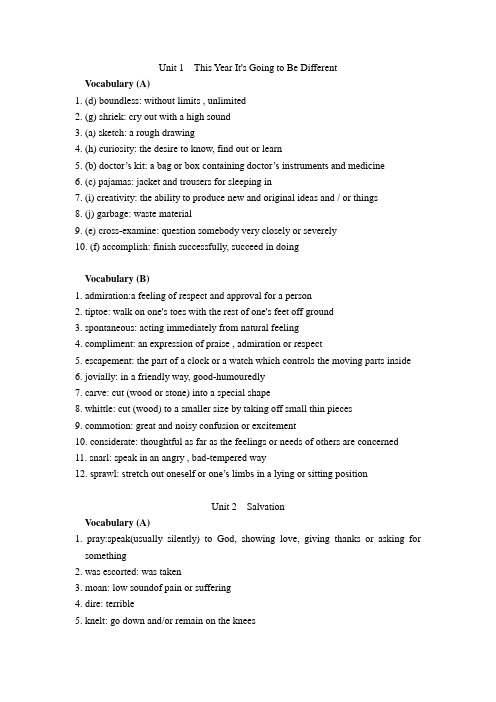
Unit 1 This Year It's Going to Be DifferentVocabulary (A)1. (d) boundless: without limits , unlimited2. (g) shriek: cry out with a high sound3. (a) sketch: a rough drawing4. (h) curiosity: the desire to know, find out or learn5. (b) doctor’s kit: a bag or box containing doctor’s instruments and medicine6. (c) pajamas: jacket and trousers for sleeping in7. (i) creativity: the ability to produce new and original ideas and / or things8. (j) garbage: waste material9. (e) cross-examine: question somebody very closely or severely10. (f) accomplish: finish successfully, succeed in doingVocabulary (B)1. admiration:a feeling of respect and approval for a person2. tiptoe: walk on one's toes with the rest of one's feet off ground3. spontaneous: acting immediately from natural feeling4. compliment: an expression of praise , admiration or respect5. escapement: the part of a clock or a watch which controls the moving parts inside6. jovially: in a friendly way, good-humouredly7. carve: cut (wood or stone) into a special shape8. whittle: cut (wood) to a smaller size by taking off small thin pieces9. commotion: great and noisy confusion or excitement10. considerate: thoughtful as far as the feelings or needs of others are concerned11. snarl: speak in an angry , bad-tempered way12. sprawl: stretch out oneself or one’s limbs in a lying or sitting positionUnit 2 SalvationVocabulary (A)1. pray:speak(usually silently) to God, showing love, giving thanks or asking for something2. was escorted: was taken3. moan: low soundof pain or suffering4. dire: terrible5. knelt: go down and/or remain on the knees6. jet-black: very dark or shiny black7. rocked: shook or or moved gently8. serenely: calmly or peacefully9. grin: smile broadly10. deceive: make sb. believe sth. that is falseVocabulary (B)1. preach: give a religious talk, usually as part of a service in church2. by leaps and bounds: very quickly3. rhythmical: marked by regular succession of weak and strong stresses, accents, movements4. sermon: a talk usually based on a sentence or “verse”from the Bible and preached as part of a church service5. braided: twisted together into one plait6. work-gnarled: twisted , with swollen joints and rough skin as from hard work or old age7. rounder: a person who lives a vicious life, a habitual drunkard8. take his (i.e. , god's) name in vain: use god's name in cursing , speak of god without respect9. punctutate: interrupt from time to time with sth.10. ecstatic: causing great joy and happinessUnit 3 Writing between the linesVocabulary (A)1. contend: argue,claim2. mutilation: destruction3. purchase: buying4. possession: ownership5. transfer: move from one place to another6. dog-eared: having the corners of the pages turned up or down with use so that they look like a dog's ears7. intact: whole because no part has been touched or spoilt8. indispensable : absolutely , essential9. scratch pad : loosely joined sheets of paper (a pad) for writing notes10. sacred : to be treated with great respectVocabulary (B)1. bluntly: plainly , directly2. Restrain: hold back (from doing sth.)3. dilapidated: broken and old; falling to pieces4. scribble: write hastily or carelessly5. unblemished: not spoiled , as new6. crayon: pencil of soft colored chalk or wax , used for drawing7. symphony: a musical work for a large group of instruments8. typography: the arrangement , style and appearance of printed matter9. humility: humble state of mind10. receptacle: a containerUnit 4 Network Designer — Tim Berners-LeeVocabulary (A)1. (c) zip off: move away with speed2. (f) unencumbered: not obstructed3. (j) nifty: clever4. (a) loose: let out5. (d) noodle around: play about6. (b) span: extend across7. (h) debut: make first public appearance8. (e) the élite: a group of people with a high professional or social level9. (g) juncture: a particular point in time10. (i) sparse: inadequately furnishedVocabulary (B)1. exotic: striking or unusual in appearance2. hack: a person paid to do hard and uninteresting work3. stint: fixed amount of work4. random: chance , unplanned , unlooked for5. reside: be present ( in some place)6. access: the opportunity or right to use or see sth.7. cobble: put together quickly or roughly8. lingua franca: language or way of communicating which is used by people do notspeak the same native language9. quintessential: the most typical10. unconventionally: doing things not in the accepted way11. Compromise: sth. That is midway between two different things12. cash in on: profit from; turn to one's advantageUnit 5 AntarcticaVocabulary (A)1. radiate: send out (lights) in all directions2. appreciate: understand fully3. outweigh: are greater than4. hemmed in :surrounded5. habitation: a place to live in6. obscure: make difficult to see7. shatter: break suddenly into small pieces8. haul up: pull up with some effort9. pore: very small opening in the skin through which sweat may pass10. unveiling: discovering, learning aboutVocabulary (B)1. distinctive: clearly marking a person or thing different from others2. spectacular: striking, out of the ordinary, amazing to see3. phenomenon: thing in nature as it appears or is experienced by the senses4. tenure: right of holding (land)5. tempestuous: very rough, stormy6. inclined: likely, tending to, accustomed to7. precipitation: (the amount of) rainfall, snow etc. which has fallen onto the ground8. disintegrate: break up into small particles or pieces, come apart9. granules: small pices like fine grains10. mercury: a heavy silver-white metal which is liquid at ordinary temperature and is used in scientific instruments such as thermometers11. disrupt: upset, disturb12. cushion: paddingUnit 6 The PearlVocabulary (A)1. (f) brush house: house made of small branches2. (i) pulsing and vibrating: beating steadily (as the heart does) and moving rapidly, here “active”, “alert”3. (b) strangle out: get the words out with difficulty in their keenness to speak4. (j) sting: a wound in the skin caused by the insect5. (e) giggle: laugh, not heartily, but often in a rather embarrassed way6. (a) alms-giver: person who gives money, food and clothes to poor people(NB: nowa rather old-fashioned concept)7. (c) residue: that which remains after a part disappears, or is taken or used(here, a metaphor using a chemical term)8. (d) lust: very strong, obsessive desire9. (h) withheld: deliberately refused10. (g) venom: (liquid) poisonVocabulary (B)1. scramble: move, possible climb, quickly and often with some difficulty2. dart: move forward suddenly and quickly3. panting: breathing quickly4. foaming: forming white mass of small air bubbles5. baptize: perform the Christian religious ceremony of baptism, i.e., of acceptance into the Christian Church6. judicious: with good judgment7. fat hammocks: (here) the doctor’s thick eyelids8. cackle: laugh or talk loudly and impleasantly9. semblance: appearance, seeming likeness10. squint: look with almost closed eyes11. speculation: thoughts of possible profits12. distillate: product of distillationUnit 11、每当他午夜下班回家,他总是蹑手蹑脚地上楼,以以免吵醒邻居.Every time when he returned home from work at midnight, he would tiptoe upstairs, trying not to waken his neighbors.2、为了与新来的邻居建立一种和睦的关系,格林先生不失时机地帮她把行李搬进屋子。
新编英语教程(第三版)拓展阅读. 第3册
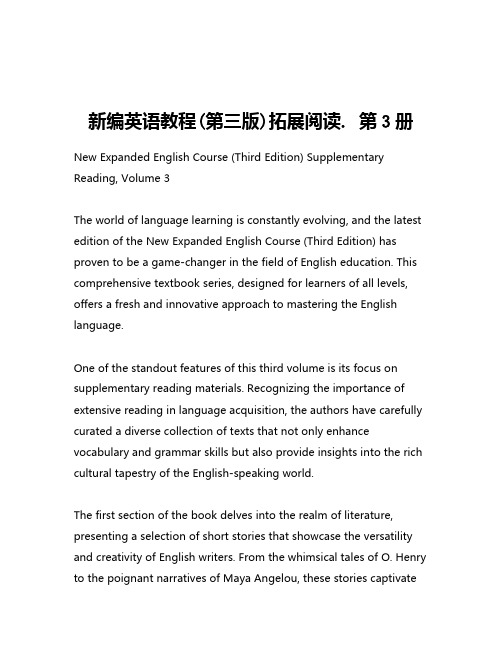
新编英语教程(第三版)拓展阅读. 第3册New Expanded English Course (Third Edition) Supplementary Reading, Volume 3The world of language learning is constantly evolving, and the latest edition of the New Expanded English Course (Third Edition) has proven to be a game-changer in the field of English education. This comprehensive textbook series, designed for learners of all levels, offers a fresh and innovative approach to mastering the English language.One of the standout features of this third volume is its focus on supplementary reading materials. Recognizing the importance of extensive reading in language acquisition, the authors have carefully curated a diverse collection of texts that not only enhance vocabulary and grammar skills but also provide insights into the rich cultural tapestry of the English-speaking world.The first section of the book delves into the realm of literature, presenting a selection of short stories that showcase the versatility and creativity of English writers. From the whimsical tales of O. Henry to the poignant narratives of Maya Angelou, these stories captivatethe reader with their vivid characters, compelling plots, and thought-provoking themes. By engaging with these literary masterpieces, students not only improve their reading comprehension but also develop a deeper appreciation for the nuances of the English language.Complementing the literary section, the textbook also features a series of informative and engaging non-fiction articles. These pieces cover a wide range of topics, from the cutting-edge advancements in science and technology to the intriguing histories and traditions of different cultures. Whether exploring the marvels of the human genome or delving into the origins of ancient civilizations, these articles challenge students to expand their knowledge and broaden their perspectives.One of the standout aspects of the non-fiction section is its focus on contemporary issues. Addressing topics such as climate change, global health, and social justice, these articles encourage students to think critically about the pressing concerns of our time and to develop their own informed opinions on these matters. By grappling with these complex and often controversial subjects, learners not only enhance their English proficiency but also cultivate a greater sense of global citizenship.Interspersed throughout the textbook are a variety of language-learning activities and exercises designed to reinforce the concepts introduced in the reading materials. These activities range from vocabulary-building exercises to grammar-focused tasks, ensuring that students have ample opportunities to apply their newfound knowledge and skills.Moreover, the textbook incorporates a strong emphasis on developing academic writing skills. Through a series of guided writing prompts and feedback mechanisms, students are encouraged to hone their ability to craft well-structured and coherent essays, research papers, and other forms of academic discourse. This focus on academic writing not only prepares learners for success in their educational pursuits but also equips them with the necessary skills for professional communication in the global marketplace.Beyond the printed pages, the New Expanded English Course (Third Edition) also offers a wealth of digital resources to support and enhance the learning experience. Interactive multimedia components, such as audio recordings, video clips, and online quizzes, provide students with additional opportunities to engage with the material and practice their language skills in a dynamic and engaging manner.In conclusion, the New Expanded English Course (Third Edition) is a comprehensive and innovative textbook series that sets a new standard in English language education. By seamlessly blendingliterary and non-fiction texts with targeted language-learning activities, the authors have created a resource that not only strengthens students' linguistic abilities but also cultivates their critical thinking, cultural awareness, and global perspectives. As learners embark on this enriching journey through the pages of this textbook, they will undoubtedly emerge as more confident and well-rounded users of the English language.。
新编英语教程第三册unit1教案资料
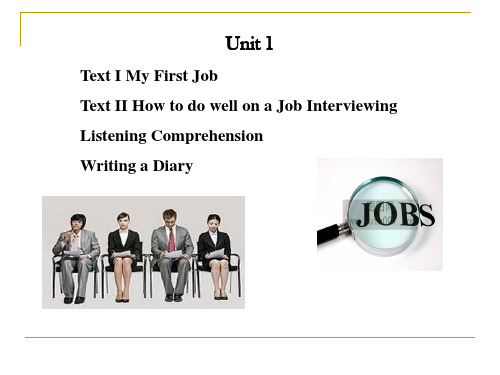
Step 1 Listening In and Speaking out !
1 Prepare for the new words 2 Listen and try to understand
1. When you receive a job offer, what issues must you consider before making a decision?
Unit 1
Text I My First Job Text II How to do well on a Job Interviewing Listening Comprehension Writing a Diary
suburb, summon, awkward, dreary, gabled, ever-green, fume, an air of, disapproval, colonel, grunt, dingy, proceed, margarine, mumble, attach importance to, consist of, appall, split, dismayed, diffidently, protest, get to one’s feet, last straw, prospect
- Arnold Toynbee
Choose a job you love, and you will never have to
work a day in your life. - Confucius
好之者不如乐之者。——出自《论语·雍也》
3. Speaking out
What kind of job do you think is an ideal job for you?
新编英语教程第三册Unit1

A
B
C
Home
Unit 1 My First Job
Before Reading
Global Reading
Detailed Reading
After Reading
Warm-up Questions 2. Have you ever had a job before? If you have, what kind of
Before Reading
Global Reading
Detailed Reading
After Reading
Warm-up Questions
3. Look at the title of this text. What do you think the author is going to talk about? Tick off the statements which you think are likely to tell the content of the text.
Home
Unit 1 My First Job
Before Reading
Global Reading
Detailed Reading
After Reading
Free Discussion
1. Are part-time jobs in the Western countries the same as those in China? What are the similarities and differences?
Before Reading
Global Reading
Detailed Reading
After Reading
新编大学英语第三版第三册
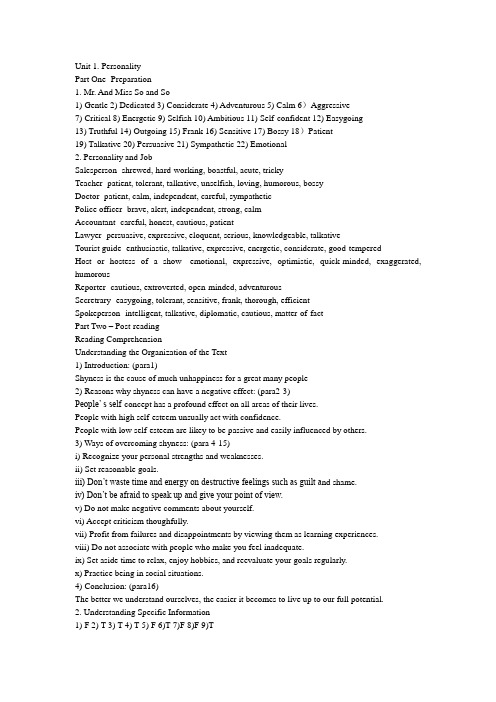
Unit 1. PersonalityPart One- Preparation1. Mr. And Miss So and So1) Gentle 2) Dedicated 3) Considerate 4) Adventurous 5) Calm 6)Aggressive7) Critical 8) Energetic 9) Selfish 10) Ambitious 11) Self-confident 12) Easygoing13) Truthful 14) Outgoing 15) Frank 16) Sensitive 17) Bossy 18)Patient19) Talkative 20) Persuasive 21) Sympathetic 22) Emotional2. Personality and JobSalesperson- shrewed, hard-working, boastful, acute, trickyTeacher- patient, tolerant, talkative, unselfish, loving, humorous, bossyDoctor- patient, calm, independent, careful, sympatheticPolice officer- brave, alert, independent, strong, calmAccountant- careful, honest, cautious, patientLawyer- persuasive, expressive, eloquent, serious, knowledgeable, talkativeTourist guide- enthusiastic, talkative, expressive, energetic, considerate, good-temperedHost or hostess of a show- emotional, expressive, optimistic, quick-minded, exaggerated, humorousReporter- cautious, extroverted, open-minded, adventurousSecretrary- easygoing, tolerant, sensitive, frank, thorough, efficientSpokeperson- intelligent, talkative, diplomatic, cautious, matter-of-factPart Two – Post-readingReading ComprehensionUnderstanding the Organization of the Text1) Introduction: (para1)Shyness is the cause of much unhappiness for a great many people2) Reasons why shyness can have a negative effect: (para2-3)People’ s self-concept has a profound effect on all areas of their lives.People with high self-esteem unsually act with confidence.People with low self-esteem are likey to be passive and easily influenced by others.3) Ways of overcoming shyness: (para 4-15)i) Recognize your personal strengths and weaknesses.ii) Set reasonable goals.iii) Don’t waste time and energy on destructive feelings such as guilt a nd shame.iv) Don’t be afraid to speak up and give your point of view.v) Do not make negative comments about yourself.vi) Accept criticism thoughfully.vii) Profit from failures and disappointments by viewing them as learning experiences.viii) Do not associate with people who make you feel inadequate.ix) Set aside time to relax, enjoy hobbies, and reevaluate your goals regularly.x) Practice being in social situations.4) Conclusion: (para16)The better we understand ourselves, the easier it becomes to live up to our full potential.2. Understanding Specific Information1) F 2) T 3) T 4) T 5) F 6)T 7)F 8)F 9)TV ocabulary1.1) self-couscious (worried and embarrassed about what you look like or what other people think of you.)2) self-confidence (belief i n one’s own ability, power, judgment, etc,; confidence in oneself)3) self-esteem (the feeling that you are someone who deserves to be liked, respected, or admired)4) self-destructive (with thoughts or actions that are counter to one’s own best interests)5) self-worth (the value you give to your life and achievements)6) self-concept (one’s conception or general idea of one’s own basic character and nature)7) self-awareness (realistic knowledge and judgment about oneself)8) self-assurance/self-confidence (the belief that you are able to deal with people and problems easily)2.1) B 2 ) I 3) L 4) A 5) H 6) D 7) E8) N 9) J 10) M 11) C 12) F 13) G 14) K3.1) profound 2)jealousy 3) numerous 4)overweight 5) overcome6) eventually 7) slim 8) compliments 9) diminish 10) reassurance11) detrimental 12) isolated 13) self-esteem 14) accented4.1) reflected 2) concerned/worried 3) profound effect/influence 4) viewed/regarded5) sensitive 6) respond/ react 7) eliminated 8) overcome my fear9) concentrate on 10) made no commentTranslation1) You should spend a reasonable amount of time relaxing and exercising.(spend time on sth/ in doing sth)2) In general children are healthier and better educated than ever before. (than ever before)3) When the right opportunity comes along, he’ll take it.4) Every day he sets aside some time to be with his family and enjoy life.5) I remember those dark streets and walking hand in hand with my father.6) He finally failed to live up to his parents’ expectations.7) In contrast, our use of oil has increased enormously.8) He succeeded in his efforts to overcome his fatal weakness.Part Three – Further Development1. Enriching Your Word Power1) B 2)B 3)A 4) B 5) D 6) C 7)B 8)C 9)A 10)A 11) C 12) BPart Four- Writing and Translation2.1) It is believed that pessimism often leads to hopelessness, sickness and failure.2) Optimism, by contrast, can make you happy, healthy and successful.3) When you fail in something, profit from the failure as a learning experience.4) Think about your strengths and build up self-confidence in front of problems or difficulties.5) Don’t let negative thoughts hold you back.6)Everyone has experienced failures and disappointments, so don’t blame yourself too much.Unit 2 Myths and LegendsPart One – Preparation4. Matching Pictures1. Aphrodite2. Ares3. Hephaestus4. Artemis5. Demeter6. Dionysus7. Poseidon 8. Athena 9. Apollo 10. hermes 11. Hera 12. ZeusPart Two – Post-reading1. Testing Your Memory1) Because they were invited to a feast in the sky.2) He saw the birds were busy preparing.3) He planned to go to the feast/ sky with the birds.4) They didn’t agree because Tortoise was mischievous/ cunning and ungrateful.5) With a sweet tongue, he convinced the birds that he was a changed man.6) He made two wings with all the features he got from each bird.7) All of You.8) Nuts, meat and fish soup, punded yam, yam soup, palm wine, etc.9) For whom have you prepared this feast?10) Because he knew the answer would be ―For all of you‖, which was his new name. So he could enjoy all the food first.11) They were very angry.12) They took back the feathers they had lent him.13) He asked him to take a message to his wife.14) Parrot, because he wanted to take advantage of the chance to get revenge.15) He asked Parrot to tell his wife to bring out all the soft things in his house and cover the ground with them so that he would be able to land safely. But Parrot told his wife to bring out all the hard and sharp things instead.16) His shell was broken into hundreds of pieces.V ocabulary1.1) A. invitation B. invited C. inviting2) A. prepare B. prepared C. preparation D. preparatory / preparation3) A. discoveries B. discoverers C. discovered4) A. approval B. approve C. approved D. approvign E. disapprove5) A. eloquent B. eloquence C. eloquently6) A. faithful B. unfaithful/ faithless C. faith D. faithfully7) A. occasional B. occasionally C. occasion8) A. delivery B. delivering C. delivered9) A. troubesome B. troulbed C. troubled D. troubling10) A. assurance B. assured C. assure2.1) got/ran into trouble 2) no trouble 3) asking for trouble 4) have…trouble5) trouble with 6) in serious/ deep/ big trouble 7) get/getting …into trouble 8) took the trouble3.1) with a pattern of roses.2) prepared a wonderful / good meal for us3) promised faithfully4) deliver this letter5) a selection of milk and plain chocolate6) keep out of mischief / behave themselves7)the sound of distant thunder8) received approval from the government9) in spite of the fact that he drank too much10)agree whether the drug is safe or notPart Three – Further Development1. Enriching Your Word Power1) C 2) C 3) A 4) B 5)A 6) B 7) A 8) B 9) B 10) A 11) B 12) APart Four – Writing and Translation2. Translation Practice万物之初,天体还是一体,充满混沌。
- 1、下载文档前请自行甄别文档内容的完整性,平台不提供额外的编辑、内容补充、找答案等附加服务。
- 2、"仅部分预览"的文档,不可在线预览部分如存在完整性等问题,可反馈申请退款(可完整预览的文档不适用该条件!)。
- 3、如文档侵犯您的权益,请联系客服反馈,我们会尽快为您处理(人工客服工作时间:9:00-18:30)。
新编英语教程(第三版)第三册
Unit 1 My First Job
Background Notes job interview A job interview typically precedes the hiring decision, and is used to evaluate the candidate. The interview is usually preceded by the evaluation of submitted résumés from interested candidates, and a selection of a small number of candidates for interviews. Potential job interview opportunities also include networking events and career fairs. The job interview is considered one of the
Unit 1
Unit 2
Unit 3
Unit 4
Unit 5
Unit 6
Unit 7
Unit 8
Unit 9
Unit 10
Unit 11
Unit 12
Unit 1 My First Job
Pre-Reading Questions
Before you read the text, think about the title and tick off the statements which you think are likely to tell the content of the text.
新编英语教程(第三版)第三册
Unit 1 My First Job
Go over the text rapidly once and then decide which of the following statements best sums up the content. ___ 1. The writer went to an interview and felt depressed. 2. The writer was interviewed by the headmaster of ___ a school and was not given a job which he needed badly. 3. The writer was interviewed by the headmaster of ___ a school and was offered a job which was none √ too pleasant.
新编英语教程(第三版)第三册
Unit 1 My First Job
2. Try to recognize the key words and phrases, i.e., words and phrases that are closely related to the title of the text; and ignore the supporting details, i.e., anything that describes, explains, or develops the main idea(s). 3. Read only the first and the last sentence of each paragraph, for, as a rule, the gist of a paragraph is found there. But, of course, there are always exceptions. 4. Read the first paragraph and the last paragraph of a text for the same reason as 3.
新编英语教程(第三版)第三册
Unit 1 My First Job
It was clearly the headmaster himself that opened the door. He was short and rotund. He had a sandycoloured moustache, a freckled forehead and hardly any hair. He was wearing a tweed suit — one felt somehow he had always worn it — and across his ample stomach was looped a silver watch-chain.
新编英语教程(第三版)第三册
Unit 1 My First Job
examinations, which are necessary for entrance to a university. The GCE was replaced by General Certificate of Secondary Education (GCSE) in 1988.
新编英语教程(第三版)第三册
Unit 1 My First Job
He looked at me with an air of surprised disapproval, as a colonel might look at a private whose bootlaces were undone. “Ah yes,” he grunted. “You’d better come inside.” The narrow, sunless hall smelled unpleasantly of stale cabbage; the cream-printed walls had gone a dingy margarine colour, except where they were scarred with ink marks; it was all silent. His study, judging by the crumbs on the carpet, was also his dining room. On the mantelpiece there was a salt cellar and pepper-pot.
新编英语教程(第三版)第三册
Unit 1 My First Job
“You’d better sit down,” he said, and proceeded to ask me a number of questions: what subjects had I taken in my General School Certificate; how old was I; what games did I play; then fixing me suddenly with his bloodshot eyes, he asked me whether I thought games were a vital part of a boy’s education. I mumbled something about not attaching too much importance to them. He grunted. I had said the wrong thing. The headmaster and I obviously had singularly little in common.
新编英语教程(第三版)第三册
Unit 1 My First Job
My First Job While I was waiting to enter university, I saw in a local newspaper a teaching post advertised at a school in a suburb of London about ten miles from where I lived. Being very short of money and wanting to do something useful, I applied, fearing as I did so, that without a degree and with no experience of teaching my chances of landing the job were slim.
新编英语教程(第三版)第三册
Unit 1 My First Job
most useful tools for evaluating potential employees. An interview also allows the candidate to assess the corporate culture and demands of the job.
新编英语教程(第三版)第三册
Unit 1 My First Job
General School Certificate General Certificate of Education (GCE) stands for an educational qualification in Britain. There are two levels of examinations in the British GCE. Schoolchildren at the age of 15 or 16 may take any number of examinations in a range of subjects and, after passing the examinations, are awarded “O” Level (ordinary level) GCEs. Students aged 17 or over may take “A” Level (advanced level)
